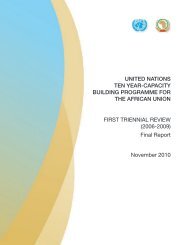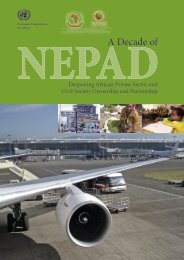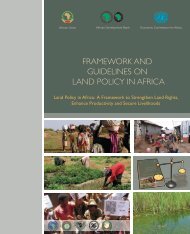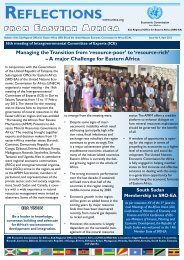Tool kit for Gender and Agriculture - Economic Commission for Africa
Tool kit for Gender and Agriculture - Economic Commission for Africa
Tool kit for Gender and Agriculture - Economic Commission for Africa
Create successful ePaper yourself
Turn your PDF publications into a flip-book with our unique Google optimized e-Paper software.
22<br />
Improving <strong>Agriculture</strong> through <strong>Gender</strong> Analysis<br />
Sources: J. Murphy, 1994, <strong>Gender</strong> Issues in World Bank Lending, World Bank, Operations<br />
Evaluation Department, Washington, D.C.; World Bank, 1994, Enhancing Women’s Participation<br />
in <strong>Economic</strong> Development: A World Bank Policy Paper, Washington, D.C.<br />
Adopting a participatory approach can promote a sense of ownership among<br />
various stakeholders toward a proposed project. In the context of Bank-supported activities,<br />
stakeholders are those affected by the outcome⎯negatively or positively⎯or<br />
those who can affect the outcome of a proposed intervention. They may include government<br />
<strong>and</strong> directly <strong>and</strong> indirectly affected groups. Getting the right stakeholders is<br />
essential to producing good results; however, because of existing gender-based differences<br />
in roles, needs, <strong>and</strong> constraints, women cannot be assumed to automatically<br />
benefit from ef<strong>for</strong>ts to involve local communities. In fact, experience shows that specific<br />
steps must be taken to ensure that women participate <strong>and</strong> benefit; otherwise, they<br />
usually do not. Consulting women stakeholders directly yields rich <strong>and</strong> detailed in<strong>for</strong>mation<br />
about their perceptions, priorities, <strong>and</strong> constraints <strong>and</strong> helps underst<strong>and</strong> their<br />
situation (see Box 5).<br />
Box 5: Consulting Women Directly: Participatory Approaches to In<strong>for</strong>mation<br />
Collection<br />
Participatory approaches are valuable in the in<strong>for</strong>mation-gathering phase or when<br />
strategies are being identified. They also enable communities to identify <strong>and</strong> express<br />
their interests in the design, management, <strong>and</strong> expected outcome of the project. Under<br />
participatory rural assessment, multidisciplinary teams of insiders <strong>and</strong> outsiders, men<br />
<strong>and</strong> women, learn from a small sample size of local people through observation, interviews,<br />
discussions, <strong>and</strong> diagrams. They use semistructured techniques (including the<br />
village-level methods listed in Table 5 to gather qualitative descriptions. The discussions<br />
are wide ranging. Little statistical analysis is done or conclusions drawn in the<br />
village; however, it is often difficult to obtain women’s opinions without the (possibly<br />
constraining) presence of male elders. Several strategies can be used to increase participation<br />
by rural women:<br />
• Negotiate early with male village elders to obtain their support.<br />
• Hold separate meetings. For example, in preparing the Egypt: Matruh Resource<br />
Management Project (Cr. 2504) a woman consultant <strong>and</strong> a woman Bedouin veterinarian<br />
held meetings with women in parallel with all-male meetings. The final project<br />
design included a rural credit component based on the needs identified by<br />
women in the participatory rural assessment. A similar process is being used in the<br />
preparation of the Philippines Natural Resources Management Project.<br />
• Identify a village woman to act as a spokesperson <strong>for</strong> the other women in a public<br />
meeting.<br />
• Employ women enumerators to gather data. For example, in developing the Women<br />
on Development Sector Strategy in Morocco, local women from ministries <strong>and</strong><br />
NGOs were trained to carry out participatory rural assessment. They were always







